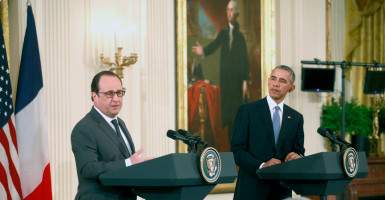President Barack Obama on Tuesday used the downing of a Russian warplane as evidence to support the view of the international community that the Kremlin get with the program in the fight against the Islamic State.
While the move by Turkey, a NATO ally, to shoot down a Russian jet that it says was flying in Turkish airspace would seem to complicate the fight against the Islamic State and the effort to resolve the broader Syrian civil war, Obama has a clear message on how the event should be felt moving forward.
“I think this points to an ongoing problem with Russian operations,” Obama said during a joint news conference in Washington with French President François Hollande. “If Russia dedicated its energy to ISIS, some of the potential for escalation would be less likely. The sooner we agree to this political process, the less likely that you have the kind of events that took place, apparently, today.”
Hollande, reeling from the terrorist attacks in Paris and looking to be more aggressive to defeat the Islamic State, also known as ISIS, ISIL, and Daesh, had a similar response.
“We can work together with Russia if it focuses its military action on Daesh,” Hollande said.
The news of the downed Russian plane hovered over the talks between Obama and Hollande, meant to bolster the international commitment to beat ISIS after the Paris attacks, showcasing the conflicts that could emerge from overlapping air campaigns.
As Obama and Hollande announced Tuesday that the U.S.-led coalition would intensify its airstrikes against ISIS in Iraq and Syria, the two leaders suggested that their efforts are limited by Russia’s lack of cooperation.
Though Russia has framed its two-month-old air campaign in Syria as a mission to kill terrorists, the Obama administration and its allies have called out the Kremlin for what it really is: an effort to support its ally, the dictator Syrian President Bashar al-Assad.
That means Russia has struck anti-Assad rebels who are not ISIS, including some groups supported by the U.S. and Turkey and their allies.
“There has never been a point where we said we don’t want Russia or other countries that may have differences with us to avoid working against ISIL,” Obama said. “The challenge has been Russia’s focus on propping up Assad rather than focusing on ISIL.”
One foreign policy analyst says the U.S. could be doing more militarily to head off Russia and assert its own strategy in Syria.
“The Assad regime is very vulnerable and weak, which is why Russia came to help,” said Jorge Benitez, an expert on NATO and defense policy at the Atlantic Council. “We need an anti-Assad and anti-ISIS strategy and to put forth resources to remove both of those threats from Syria.”
Steve Bucci, a foreign policy and national security expert at The Heritage Foundation, contends that Turkey was right to confront Russia and that such aggression will deter the Kremlin in the future.
“The way Turkey responded tells Russia that this provocation doesn’t work out so well,” Bucci said. “Perhaps showing that strength will force him [Russian President Vladimir Putin] to entertain what Obama and Hollande want, and say, ‘Well maybe we should work together on this.’”
Obama and Hollande promised a unified response to the terrorist threat but made sure to emphasize their belief that a political solution would be most effective in ending Syria’s four-year-old war, easing the path to defeat ISIS.
Hollande has already directed France in recent days to bomb ISIS targets in Syria, after the country’s efforts before then had been limited to Iraq.
White House Press Secretary Josh Earnest said France was able to conduct its airstrikes in Syria only with the aid of the U.S., which provided intelligence on targets and other assistance.
“Together with President Obama we want to share our relentless determination to fight terrorism anywhere and everywhere,” Hollande said. “Militarily [that means] destroying Daesh where they are, hunting down leaders, dismantling networks, and taking back territory they control. There is a new mindset now.”
Obama and Hollande, who called for better intelligence sharing between allied nations, said they have asked the European Union to better share flight passenger information to limit the flow of foreign fighters between the bloc’s open borders.
“We’re here to declare the United States and France stand united in total solidarity to deliver justice to these terrorists and to defend our nations,” Obama said.
“This barbaric terrorist group and its murderous ideology pose a serious threat to all of us. It cannot be tolerated, it must be destroyed, and we must do it together.”
Still, as the friendly nations presented a united front, it was clear that the world’s eye is on Russia.
After leaving Washington, Hollande will travel to Moscow to meet with Putin.
“We’ve got a coalition of 65 countries who have been active in pushing back ISIL for quite some time,” Obama said. “Russia is a coalition of two—Iran and Russia supporting Assad. Given Russia’s military capabilities and the influence they have over Assad, them cooperating would be enormously helpful in bringing about a resolution of the civil war in Syria and allow us to refocus our attention on ISIL. We hope they [Russia] refocus their attention on the most substantial threat.”
But any cooperation seems far off, Benitez says.
“I am very worried about Russia’s response,” Benitez said. “Putin is the type of leader who makes miscalculations and takes greater risk than people expect him to. So I don’t think he will become what we want him to be—safer and calmer. I think these military accidents, crises, and confrontations will continue, because like we’ve seen, Putin doesn’t turn the heat down when he’s threatened. He turns it up.”
























